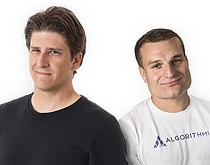Diego Oppenheimer has spent the past few days looking for a line of code by slogging through algorithms. Not fun, but it’s part of his job. He’s a program manager at Microsoft and is responsible for finding ways to make large amounts of data easier to analyze for users of Microsoft software such as Excel, SQL Server, or PowerPivot.
 Programs like these are built on algorithms, seemingly endless lines of programmed computer codes that tell computers how to perform tasks and solve problems ranging from generating directions in Google Maps, formulating movie recommendations in Netflix, or recognizing faces in digital camera frames.
Programs like these are built on algorithms, seemingly endless lines of programmed computer codes that tell computers how to perform tasks and solve problems ranging from generating directions in Google Maps, formulating movie recommendations in Netflix, or recognizing faces in digital camera frames.
In order to improve the programs, Oppenheimer (CMU’07) must improve the algorithms on which they run. That’s why he’s painstakingly combing through algorithms, hoping to extract solutions from the esoteric research.
There must be a better way, he thinks, so the Carnegie Mellon alumnus phones Kenny Daniel (CS’06), one of his college buddies, who is a PhD candidate studying artificial intelligence at the University of Southern California. Daniel, like Oppenheimer, is surrounded by state-of-the-art algorithms, many of which exist only in academic papers from obscure academic conferences.
With such a large supply of highly innovative algorithms in academia and a large demand for innovation in corporate research and development—because the algorithms make “smarter” applications—the two decide to work full-time “building a community around algorithm development and implementation.”
They call the community Algorithmia, which provides a live-Cloud platform that streamlines the search for (and implementation of) new and improved algorithms. Programmers can upload their algorithms and make them available to developers in fewer than 10 lines of code in any computer language, thanks to Algorithmia’s easy-to-use web service API. The cost developers incur for each algorithm depends on the prices set by the algorithm creators and Algorithmia themselves.
 What that means is that, on one end, programmers who either innovate preexisting code or create their own original code can sell it for profit and have the chance to see their otherwise obscure experiments potentially utilized by major companies. On the other end, companies interested in cutting-edge technological innovation have an accessible and reliable resource for such innovations. No need for a Microsoft-sized research department. By eliminating the need for complex infrastructure and implementation problems, Oppenheimer and Daniel believe consumers on both ends will be incentivized to solve complex problems in new, creative ways—while giving smaller, independent start-ups without R&D budgets a chance to utilize the very latest algorithms.
What that means is that, on one end, programmers who either innovate preexisting code or create their own original code can sell it for profit and have the chance to see their otherwise obscure experiments potentially utilized by major companies. On the other end, companies interested in cutting-edge technological innovation have an accessible and reliable resource for such innovations. No need for a Microsoft-sized research department. By eliminating the need for complex infrastructure and implementation problems, Oppenheimer and Daniel believe consumers on both ends will be incentivized to solve complex problems in new, creative ways—while giving smaller, independent start-ups without R&D budgets a chance to utilize the very latest algorithms.
Others agree. Since last year’s creation of Seattle-based Algorithmia, nearly $2.4 million has been raised in seed funding. By coincidence, one of the investors is another Carnegie Mellon alumnus, Oren Etzioni (CS’88,’91), a successful entrepreneur and CEO of the Allen Institute for Artificial Intelligence.
Oppenheimer and Daniel plan to allocate the bulk of the capital toward expanding their algorithm library and Cloud platform. Algorithmia has been in private beta testing since March 2014, with open beta scheduled to begin later this year.



